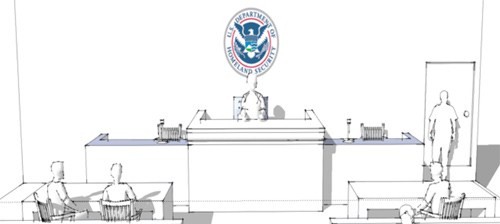A. When a person is initial taken into custody by ICE, ICE issues a ‘notice of custody determination.’ In this notice, ICE makes the initial determination as to the detainee’s bond eligibility. Typically, there are three potential outcomes:
(1) Released on Recognizance (ROR), where a person is released without being
required to post a bond;
(2) a bond amount is set and must be paid in full in order to be released; or
(3) the person is found to be mandatorily detained and, therefore, may not be bonded out.
II. Bond Redetermination
A. If ICE determines that the person is mandatorily detained and, therefore, is not eligible for bond or if the detainee feels that the bond amount is set too high, the initial determination may be appealed to an Immigration Judge (IJ) to be reviewed at a bond redetermination hearing.
Note: The IJ does not have jurisdiction to review the initial bond determination for Arriving Aliens.
B. At the bond redetermination hearing, the IJ considers several factors,
such as:
1. Whether the detainee is mandatorily detained
Ex: arriving alien who is in removal proceedings or an alien convicted of an aggravated felony;
2. Whether the detainee is a flight risk
Ex: few or no family ties to the U.S. or no possible relief from immigration proceedings; and
3. Whether the detainee is a danger to society
Ex: criminal record (e.g. gang involvement; drug/alcohol abuse), testimony of victims (in cases such as domestic violence).
• The IJ will typically reach one of 4 conclusions at the bond redetermination hearing:
1. The initial ICE bond determination may be confirmed;
2. The IJ may determine that the detainee not eligible for bond, and therefore, mandatorily detained;
3. The bond may be reduced (the minimum amount is $1500);
4. Bond may be granted with conditions
Ex: No driving, no drinking of alcoholic beverages; no contact with the victim.
•Once bond is set, the detainee has 3-4 weeks to post the bond. A detained master
hearing date will also be set to provide a court date in case bond isn’t posted within the 3-4 week time frame.
•If bond is posted, your case does not terminate – it will proceed in a non-detained setting. You must notify the IJ of the address where you will be residing during proceedings so venue can be changed.
III. Posting Bond
A. Bonds are posted with ICE, usually with one of two methods:
1. Pay with cash
-you cannot post your own bond. It must be paid by a ‘guarantor’ who is either a US Citizen or Lawful Permanent Resident (LPR)
2. Use a bondsman
-if you’re able to find an immigration bondsman who will post the bond,
you must usually secure the bond amount with collateral
-expect to pay at least 15% of the bond amount to the bondsman and also be prepared to provide collateral upon which the bondsman can place a lien for the bond amount or a credit card number with available credit to secure the bond amount.
B. Bonds are returned to the guarantor once the case is over.
IV. Second Bond Redetermination
A. If a bond amount is set at the redetermination hearing and you later find that you’re unable to post that amount, you may request a second bond redetermination hearing before an IJ.
B. To have a second bond redetermination hearing granted, you must show that there has been a material change in circumstances.
V. Appealing a Bond Redetermination
A. Both sides (the detainee and the Government) may reserve appeal of the IJs decision made at the bond redetermination hearing.
B. Bond redetermination appeals are made to the Board of Immigration Appeals (BIA).


